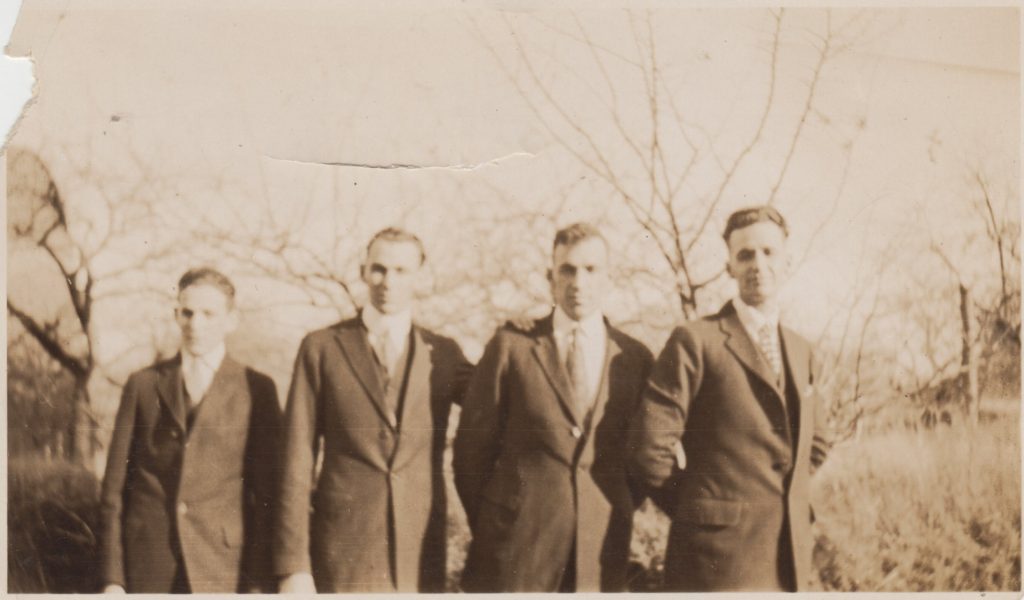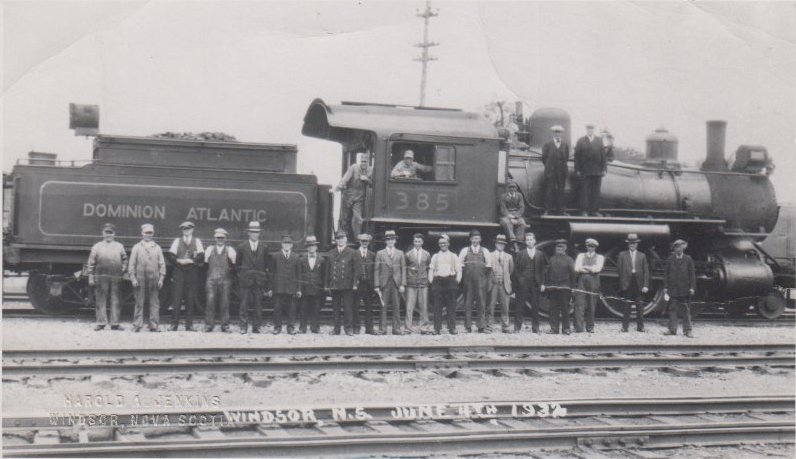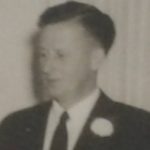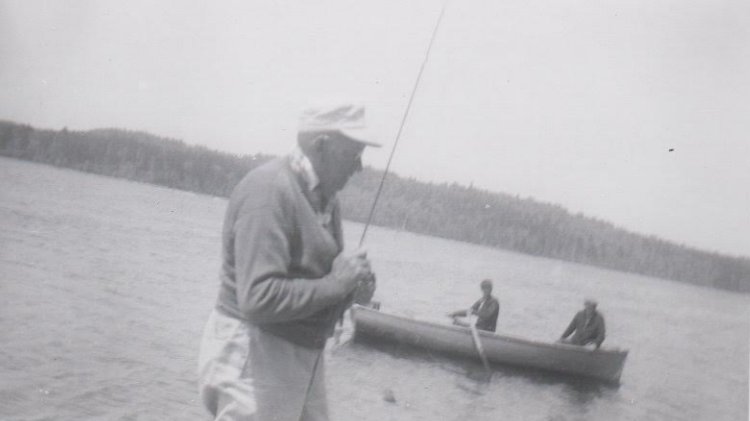Originally published in “Aged To Perfection – The Annapolis Valley 50+ Seniors Magazine” Vol. 2 Issue 1, January 2000
As a young boy growing up in Hantsport the D.A.R. (Dominion Atlantic Railway) played quite a large part in my life. My grandfather, Ned Harvie, had been an engineer and my Uncle Arthur was a fireman-engineer. My Uncle Sim was a brakeman-conductor. My father, Leland Harvie had planned to work on the railroad also, but on his return from the trenches of World War One he was not able to. He continued to be interested and so whenever he or his brothers were together the conversation invariably dealt with railroad matters.

Our house was but three houses away from the tracks on one side and the grocery business which he owned was almost as close on the other side, so that he or one of us was regularly out waving to one or the other of my uncles as they went by. My father had the contract for delivering the mail from the post office to the station and back again, which meant that the trains had to be met four times a day six days a week, rain or snow, sleet or hail. As he only had Wednesday afternoons off this was not as bad a commitment as it might seem and if he did want to go away he could usually get his delivery man, Ted Patton in those days, to deliver the mail for him.
When I became older I did my share of delivering the mail. When we didn’t need the horse and wagon I had a sled in winter and a two wheeled cart in summer that Albert Cuvilier made for us to carry the mail back and forth. I spent a good many hours waiting in the station for the train to come in as the afternoon trains were often late. There were two trains in the morning. Number 96 which ran from Kentville to Halifax and came back again in the afternoon as number 97. and number 95 which came from Halifax and ran to Yarmouth and returned the next day as number 98. Numbers 96 and 97 were combination passenger and freight trains and were indeed very slow as they worked freight along the way.

I can remember getting off number 96 on the way to Halifax at Mount Uniacke or Windsor Junction and picking blueberries while waiting for the engine to finish shunting freight cars around. Numbers 95 and 98 were express trains and did not work any freight, however they all had mail cars on which the mail was sorted during the trip. It was possible then to send a letter to Windsor and have an answer back the same day.
The latest I remember any of the trains coming through was during the blizzard we had on the day before Christmas in 1946. It was snowing so hard you could not see much more than about fifty feet. When number 95 came in, the engineer could not possibly see back to the station and had to try to guess where to stop. He missed and as the mail car went slowly by, I managed to throw on only two or three mail bags. Number 98 did not arrive until eight o clock the next morning. I had taken the mail bags home and they all went on when the train did arrive. To this day I still have a nightmare of trying to get to the post office to get the mail to take to the train which is already at the station and not being able to make it.
In 1940, having finished school, I spent some time in the local station with Murray Daniels with the idea of learning to become a station agent. Having no ear for music I was having difficulty learning to use the Morse code, but did teach myself to type, and as a result had the opportunity to go to work in the CPR telegraph office in Halifax. During my time in the station I became acquainted with some of the trainmen such as Joe Dickie, Ben Patten, Mel Benjamin etc. The trainmen were always most obliging. If we were going fishing at Stillwater, we just had to tell the conductor and they would stop the train to let us off and when we were waiting to come home, they would stop to pick us up.

Some time in the summer of 1946 or 47, Ray Burgess and I decided to go fishing. We left the car by the station in Ellershouse and went on to Stillwater on number 96. We fished all day and planned to come back to Ellershouse on the midnight train from Halifax. There were two in those days, one going each way. They were mainly freight trains with one coach and caboose on back. It was a very dark night and it had been raining. As we waited for the train, around eleven o’clock I built a small fire so the engineer would see us. As it happened my Uncle Arthur was the engineer, but when he came along he misjudged and by the time the train stopped it was about fifty feet beyond us. By the time we put out the fire, gathered up our gear and raced for the train, it had started up and left us there. We had to walk the two or three miles back along the track in the pitch dark. I never let him forget leaving his nephew stranded in the middle of the night.

Another time when I was in the army stationed in Halifax, I had been on leave at home and planned to go back to Halifax on the midnight train. When I got on, who should be the conductor but my Uncle Sim. He took me back to the caboose and let me sleep on one of the bunks all the way.
It was truly a user friendly railroad which belonged to another, and I think a better time, and is greatly missed along with my father and uncles.
